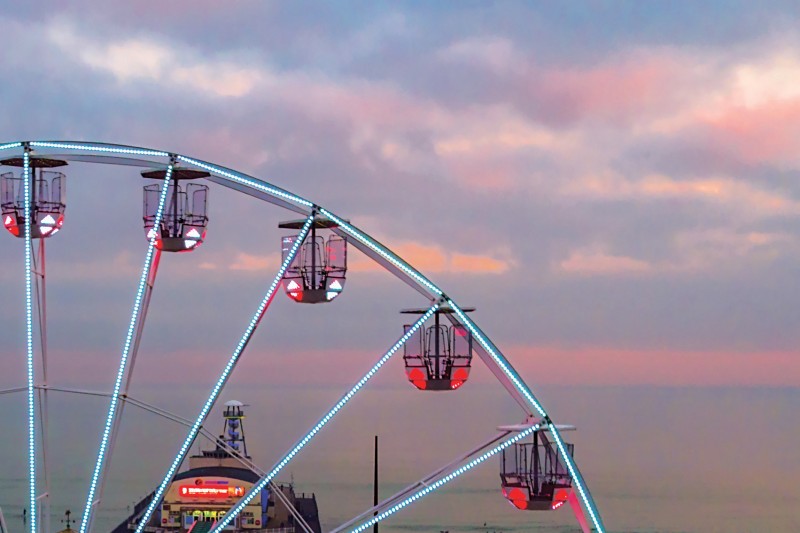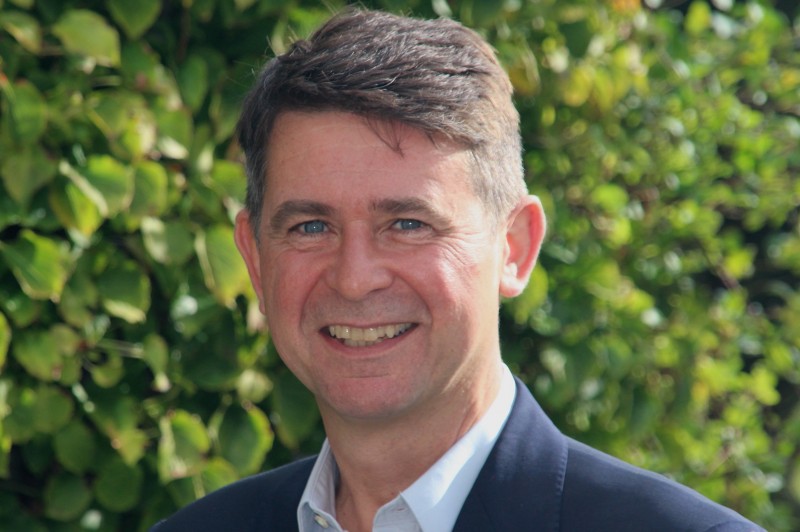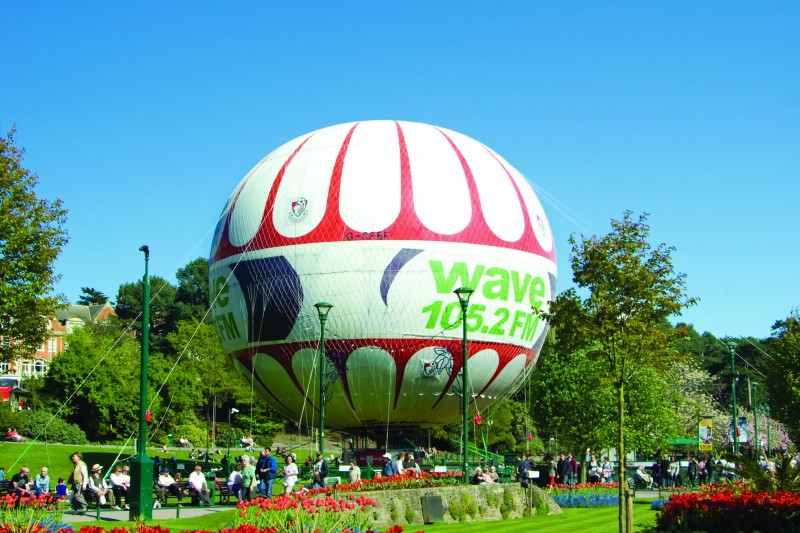Bournemouth University alum Dan Wood has already achieved so much since graduating from his Leisure Marketing degree in 2004.
Always keen to be his own boss, Dan set up the world Freestyle Football Federation – to help encourage awareness and participation in the sport. His work has taken him around the world, meeting famous footballers and growing a sport that ‘can be played by anyone, anywhere’.
We caught up with Dan when he came back to BU to talk to current Leisure Marketing students about what he’s been up to since leaving university:
You were invited back to talk to students today, what have you been doing while you’ve been back on campus?
It’s been good to come back and see how things are going at the university – it’s amazing how much its grown, it’s amazing to see the facilities and services available, the quality and size of the lecture theatres. I left 10 years ago and I came back in 2007 so it’s been 7 years of not seeing anything so it’s been nice. It’s been great to catch up with some of the lecturers who are still here too – which is always impressive!
You graduated in Leisure Marketing in 2004. What was next for you?
In 2002, my gap year at BU, I went to Germany to work for Adidas – I was the first student from Bournemouth University to open up that relationship. I spoke German, which was a big help, and they were excited about the course and the diversity of the subjects taught because they hadn’t heard of it before. I went over to Germany and I still class it as the best year of my life in terms of the people I met, what I learned in such a short space of time and being out of my comfort zone – I took a lot of learning from that. I then came back to BU to finish my degree and then I moved to London.
When I got to London my first job was for a property surveying company, doing their marketing, which I actually hated! 3 months into that I managed to find a job with Reebok, heading up their marketing for the north of England.
I have always wanted my own business but was never really sure what that would be – I just knew it would be sport in some context. When I was at Reebok I bumped into an old friend of 20+ years from school. He was working as a skills coach at Leeds United at the time – without much thinking or planning we went to market with a concept he’d developed, which was accelerated learning for children on the street through football. It was basically street level skills coaching with music; dance and football all fused together, called BallFusion. We went to the market with the idea of training academies and developing talent, but very quickly, within six months even, we’d found a talent for the commercial side of this world.
We developed a DVD; we developed links with former professional footballers who were doing similar things in Denmark and in Holland. The local councils in the UK were also starting to use us to put on three vs. three football events for local kids in their area who were causing trouble. We started working with diversionary tactics for the councils; we worked on education sessions for local schools. It really was two years of absolute mayhem doing anything and everything we possibly could around developing talent and opportunities for young people.
Long story short, in 2008 I had to file for bankruptcy because my business partner left out of the blue – even though I’d known him for 25 years – and he sent me a text message to say he was leaving the business and was taking the concept with him. It was down to the chaos of the business – I think he was less of a risk taker than I am.
Filing for bankruptcy was actually one of the best decisions I ended up making – it was a case of right time and right place because we’d met all of these freestyle footballers through the work we had been doing. These guys were amazing. They were training for 7 hours a day just to get a video together to post to YouTube to share with their friends. They were amazing talents and amazing role models because they were self-taught, but no one gave them any structure or support, they were just doing it for the love of it – they were making these videos to just get their next gig, in the hope that someone would hire them for the next TV commercial or whatever it may be.
Completely fortuitously, the day after I filed for bankruptcy I was with the UK freestyle champion at the time and I’d built up quite a good relationship with him through the work we’d been doing. He invited me to go out to Malaysia with him for a gig, he was hired to do a tour out there and asked me to go with him to do his marketing. Of course I went with him!
I had all these ideas and philosophies from what we were doing before but I also knew that there was a real niche in building a federation. I knew someone from FIFA [football federation] from my Adidas days so I was talking to them a little bit about it too. It was a simple idea ‘what if there was a socially responsible federation out there who could look after a growing new sport within the football industry’.
We touched down in Malaysia and the first person I met was my now business partner in the Federation. I talked to him about the idea and he immediately got it, he loved the idea and the education angle. Within three years we’d developed the concept fully and travelled extensively – I’ve been lucky to have these great opportunities to travel and meet amazing people and experience different cultures.
I built these local contacts, which are now local associations, contact points within each market to communicate about the sport. In 2011 we registered in the UK as a non-profit association, a Federation, and we are now at 93 country members and we are trying to learn from other sports – we are not trying to invent the wheel from scratch but we are trying to take what is essentially a street demographic, a street sport, and make it more accessible as a sport and less scary on the street but more secure for the parents, schools and teachers but to retain the cool element for kids to pick it up anywhere. That is the biggest challenge!
We’ve got event structures that happen across all the cities around the world. Anyone can pick up a ball and juggle it and now they can live from it in a realistic context from competing against each other to the arts side of it where they can show off their skills as a job.
Are you any good at freestyling yourself?
[LAUGHS] I can do a little bit. Sports marketing is my focus and I’m more of a behind the scenes person. I get in front of the camera as little as I can basically. Being a part of shaping this as a new sport and shaping the educational side of it is my main focus.
There is the sport side of it and professionalising that – that’s very exciting, we want to be FIFA in the street one day. We want to be as big and powerful as that without the politics! But to get to that stage we want to differentiate from every other federation – so we’ve taken the ATP system for our rankings – we’ve learned a lot from tennis in that regard. We’ve also learned a lot from snowboarding and skateboarding and how they have developed ‘parkour’ style events recently. We’ve even been learning from Formula 1 where they have a model of how they tour events in different cities. So really we’ve been taking broad sector for learning and establishing an exciting TV proposition which will hopefully bring the sponsors and the advertisers in, as well as the media.
But going back to the education side, the real point of difference for us is looking at how children can learn through the tricks and through the discipline. The opportunity is to improve our participation because anybody can juggle a ball; we’ve written programmes about how children can improve their life skills through that. So we’ve written programmes about nutrition, anti-bullying, science, technology and even maths; kids are learning tricks with the ball – we are doing this digitally so we can replicate it everywhere – we don’t need to have coaches going out all over the world or up skill teachers – we can teach through digital.
From this year, from 2015, kids are going to be learning this in schools as a part of their syllabus, part of their everyday learning. Not just to learn some new skills with a ball but hopefully to become better people as a result of it too.
How has the sport grown? Has sponsorship exploded in the sport like in 90s with traditional football?
One massive factor for me was not trying to be FIFA or anyone else from the outset. It would have been very easy to get an Adidas or a Reebok from the start as a global ambassador. They could sponsor us, give us a load of kit and make it look pretty – but actually it would have been their product. It’s like Red Bull, you look at all the events they do and it is their way or no way. So we were really trying to avoid the branding at the beginning to make it as pure and as authentic as possible – to develop it for the athletes first and foremost and then build the portfolio around it so we can then target the sponsors that we want as opposed to bending to someone we don’t want for a short term deal to get some good exposure from it.
We’ve worked with every sponsor under the sun within the football and entertainment industries. We created a computer game with EA Sports called FIFA Street. For the World Cup we had contracts with Castrol and Visa and Barclaycard. We’ve done hospitality events for people. Everyone has used freestyle but no one really knows about it still.
FIFA Street [computer game] was interesting. We did all the 3D modelling for that and put the characters in the game for them. We consulted on the whole usability of it – that was really good.
Most recently, and most humbling actually, was when we were invited over to Mexico to meet [professional footballer] Ronaldinho who is now our global ambassador. He volunteered to be so because he loves the sport so much and that’s what he does as a part of his warm up so it was a very authentic match for us. We’ve worked with Ronaldo and Messi as well but he’s still the one that stands out as the pinnacle so with his help in the new year and beyond we really hope to get this sport on the map and on TV regularly and then attract sponsors because they will then understand the value of it.
It’s got a loose relationship to football. It is the entertainment in football right now but, with Ronaldinho for instance, he played the sport as a kid and no one taught him to do that and no one taught him to be as good as he is now but he’s found his own pathway to football from freestyle at the outset. Our ultimate goal is for the footballing world to recognise that if more children were freestyling, their touch their confidence on the ball, their body awareness and their balance is going to be way about anyone else in other football academies that just go straight into strength and conditioning training. There is a football correlation in the long term but right now it’s more about celebrating this as a lifestyle and a culture that can impact at community level and in the media as well.
It sounds like football and freestyle football have very different skillsets – is it helpful that they are classed as two different sports?
We are trying to separate the sport from football completely. We don’t want to be under the umbrella of FIFA or anyone else. Until 2008 this was an art as well – that is the history of this. The history of freestyle goes back way before football. We’ve traced it back over 2000 years to games in Asia. In China there’s a game called ‘Jianzi’ that uses a shuttlecock – like ‘hackeysack’ but with a shuttlecock. We’ve found games in Myanmar and Malaysia that have been around for centuries and centuries that are all about an artistic display of tricks with this object – not always a ball either – being juggled around amongst friends with people trying to outperform each other. There is a style element that is carried right the way through – it then became popular with circus acts, it was a juggling trick in the 1800s and 1900s. In the 1980s and 1990s people like Maradona and Ronaldinho started using it in their warm ups and football sort of adopted it because it was part of their warm up. It was how they switched their heads on as well as their bodies. Since social media, TV advertising campaigns – Nike in particular with their Joga Bonito campaign – that turned everyone’s attention to the street side of it. Then in 2000 Red Bull launched their Street Style which was more of a battle. So instead of an individual juggling a ball this was more of a head-to-head competition between two people; three minutes, a live DJ and every 30 seconds the ball transfers and they have to outperform each other to impress the judges and the audience. The winner would be demonstrating the most difficult ability and style.
What have the highlights been for you – who have you met?
Going back to the very start in 2006, I’m a [Tottenham Hotspur] Spurs fan and [former Spurs player] Edgar Davids was one of the first people to get involved so I was happy about that – he’d been doing it for years anyway in Holland. Working with him on a few projects at the beginning was a great start. Then Brian Laudrup in Denmark, Lucas Radebe in South Africa, and Lionel Messi as a part of our work with the FIFA Street game – we were involved in Spain with him. Ronaldo has done countless TV commercials in Portugal and Spain that we’ve assisted and helped to choreograph. The list goes on!
We have to play it very cool though, we can’t be fans because we are cooler than them [laughs]. It’s a very surreal thing to deal with because you’ve got to deal with it. We were at Ronaldinho’s place only four weeks ago and he’s a very humble, down-to-earth, amazing guy and he has his friends and family very close to him and I was reminiscing and thinking about the other personalities who have bought into the Federation. In that environment you’ve got to be careful not to come across as a massive fan because you’ve got to work alongside this guy – you can’t just be posting selfies – so it’s a humbling experience when you step back and think how far we’ve come.
And what would you say the coolest thing you have done is?
Seeing a computer game come from nothing to being out on the shelves in a shop with the names of the people we work with every day in the game as the stars alongside the Messi’s of the world was very cool.
We are lucky to be able to travel to amazing cities and see different cultures and different lifestyles – to see the impact of young people getting involved in this kind of stuff and how quickly they learn. Every place you go is new even though they are doing different things is amazing. From Malaysia to Cape Town to New York; it can be very exciting.
So looking to the future; what is the small to mid-term future for you? What is your next step?
The two product development side of things are sustainability for the sport – that’s going to come from training trainers as opposed to young people all the time. That is something we’ve done a lot of and that always goes down well. It is quite hard to sustain though because there are only 4,000 freestylers in the whole world and commercially they can’t be in schools every week delivering training sessions so we’ve written a teacher training course which is going to up skill primary school teachers, football coaches, parents and volunteers to be able to facilitate freestyle and use the technology that’s out there and use the web as well as the resources we are going to give them, and incorporate them into their own sessions. Whether they are football coaches or geography teachers they should be able to teach.
There’s one trick called around the world, for example, that we are relating a lot of geographical questions to so the kids are subliminally learning around geography while they are learning cool tricks. It’s empowering others to teach what we are doing – we are building a team of ambassadors around the world through it.
The other development we are going to make is the world tour – it is going to be the biggest flagship event for us. It will be a series of events, not just one static world championship. This year we were in Beijing, London and Johannesburg and we’re going to grow it to six locations next year – and for the first time we will be able to pre-schedule it from January so we’ll be launching the tour from the start – this year was a bit hit and miss as we had to organise the tour on an ad-hoc basis. By 2016 we will then be running a World Tour with 10 events per year. This is our TV platform and our strongest sponsorship platform.
The Formula 1 for the football industry is what we are trying to proposition it as. So there’s 10 cities every year on the tour for the top 16 athletes in the world to travel to each one and battle head to head to become World Champion at the end of the tour. Its already in motion – there were three events defining it this year but the aim is to hit 10 by 2016.
What was it about BU that got you to where you are?
The diversity of the subject area and the people I met were invaluable in helping me to get where I am. For me I often refer to it [the course] as sports marketing because that was my main focus. But what the course gave me, and what Adidas picked up straight away, and the reason they invited me over for the internship, was based on the diversity on offer – there was no other course from any other university they had seen that gave that breadth of international marketing experience as well as local business intelligence and strategy and everything else; event management too. The people were amazing too, BU has an amazing social life and I made amazing friends who have stayed with me for life, people who I have actually come back to see now and will continue to in the future. I’m actually working with them on a couple of projects too – Bournemouth University students get everywhere! So I’ve met them in the most remote places when travelling round the world, and it’s really helped because it’s an icebreaker within conversations and you develop a rapport much quicker.
What one piece of advice would you have for current students who would like to become like Dan Wood in the future?
There were three things that I wanted to pass on to current BU students, three bits of advice. The first of which was travel – at any given moment take any opportunity to go overseas and learn from other people and other cultures and put yourself in difficult situations because people will help and you’ll learn a lot. The second is being positive. A lot of what has happened to me has not just happened, I have had to put myself out there and it has meant that I’ve experienced bankruptcy. I’ve had what I would call my ‘35p moment’ where that was all I owned in the world and I had a couple of hours thinking, ‘what am I going to do next?’ But instead of dwelling on it you’ve got to get out and do something about it. That positivity took me to Malaysia the very next week and it has put me where I am now. So there are things that always happen when you’re positive and when people can relate to you as being a happy and positive person.
Finally, socialise. Be around good people, your friends and your family – listen more rather than talking at people all the time – you will learn a lot and people will always want to help you. It will open up doors where you will at least expect it! Get out there and be positive because it worked for me!
For more information about freestyle football, and the Freestyle Football Federation, visit http://freestylefootball.org/.



